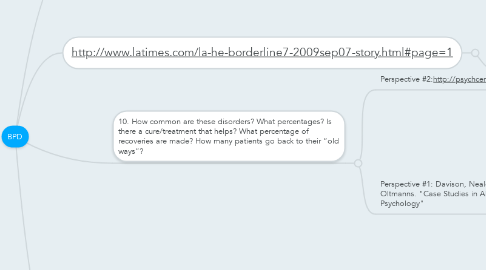
1. 2. What kind of treatment are used for BPD and are there any medications commonly prescribed? If so, which ones? How effective are they?
1.1. Perspective #1: Davison, Neale, Oltmanns. "Case Studies in Abnormal Psychology"
1.1.1. ABCD: Each author has some sort of degree in medicine, psychology, ect. No biases detected; stories are told from a medical point of view about the patients. Story talks about the patients childhood, sort of explains why Alice is the way she is or what other things may contribute to the diagnosis.
1.1.1.1. Section is about an actual person with BPD -Most doctors believe that BPD is developed over time. -Some doctors believe that BPD is related back to your childhood. -Depending on how you were raised(with a good temperament, or not) can greatly effect this. -Severe changes in a small child's life may effect this.
1.2. Perspective #2: Corey, Gerald "Theory and Practice of Counseling and Psychotherapy"
1.2.1. ABCD: Author is a doctor. No biases were picked up. The excerpt talks about different approaches you can take with people with certain disorders and different ways you can help them. It also gives ideas about how to help the family members and friends of the patient. Source was published in 1996.
1.2.1.1. -Psychotherapy -Hospitalization -Antipsychotic drugs -Neuroleptics(small doses) -Antidepressants -Antianxiety drugs -Self help methods
2. 10. How common are these disorders? What percentages? Is there a cure/treatment that helps? What percentage of recoveries are made? How many patients go back to their “old ways”?
2.1. Perspective #2:http://psychcentral.com/lib/borderline-personality-disorder-treatment/0001065
2.1.1. ABCD: Author has his degree in Pyschology and is a professional psychiatrist. The tone of the excerpt is to inform people of BPD and give some background of some of the symptoms or criteria that need to be met to be diagnosed with BPD. Source was updated in 2014.
2.1.1.1. -Patients may have lapses where they go back to certain symptoms that are in the process of being fixed -Percentages of suicidal behavior with dialectical behavior therapy and general psychiatric management vary. Patients shown to have dialectical behavior therapy had a lower percentage of suicidal behavior. -While DBT is can be very effective it requires a specially trained therapists and long-term commitment on the clients end as well
2.2. Perspective #1: Davison, Neale, Oltmanns. "Case Studies in Abnormal Psychology"
2.2.1. ABCD: Each author has some sort of degree in medicine, psychology, ect. No biases detected; stories are told from a medical point of view about the patients. Story talks about the patients childhood, sort of explains why Alice is the way she is or what other things may contribute to the diagnosis.
2.2.1.1. Patient(Alice), was put into hospitalized care and although she seemed to be having a good recovery, it was a façade. Alice was on a temporary "high" and returned to her old ways. Manipulating, lying, etc.
3. How come most psychologists/psychiatrists don't want to have a patient diagnosed with BPD? How does this affect them and their work?
3.1. Perspective #1: http://psychcentral.com/lib/borderline-personality-disorder-treatment/0001065
3.1.1. ABCD: Author has his degree in Pyschology and is a professional psychiatrist. The tone of the excerpt is to inform people of BPD and give some background of some of the symptoms or criteria that need to be met to be diagnosed with BPD. Source was updated in 2014.
3.1.1.1. -Doctors tend to shy away from taking on cases or patients diagnosed with BPD because that person is or will be very dependent and will need lots of work. For lots of doctors this is a turn off because they don't want to be constantly dealing with their patient. Which is understandable. -Doctors get frustrated with these patients because some patients appear to be making progress, getting better, and then suddenly they just drop. And all of the hard work you've done trying to help them get better is lost and you have to start all over. Which is very frustrating.
3.2. Perspective #2: Rosenfeld, Isadore, M.D. "The Best Treatment"
3.2.1. ABCD: Author is a doctor. No biases were detected. Purpose of the excerpt from the book is to inform people about certain treatments with their pros and cons, what works best for some people, why certain things may not work, etc. Source was written in 1991.
